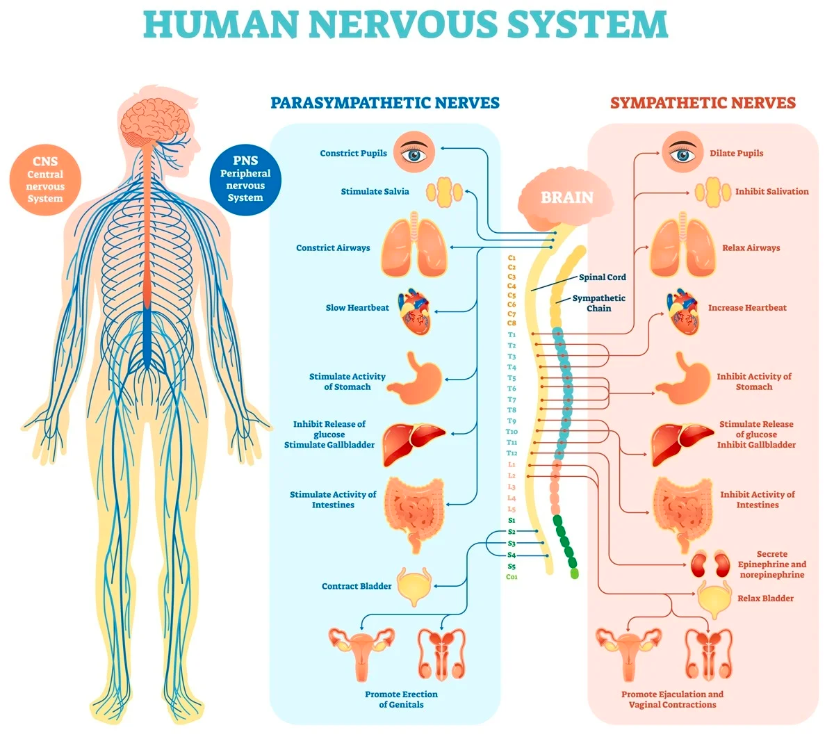Does stress really impact our gut health? (Why it matters & what to do about it)
June 16, 2023
All things gut health have skyrocketed in popularity in the last 10 years. What used to be a relatively unknown aspect of our body is now often referred to as the “second brain”. The gut influences everything from your mood to your cravings and even how often you get sick. We’re so often advised to “manage our stress” by our doctors and loved ones. But today I hope you’ll have a clearer picture of the direct impact stress can have on our incredibly powerful gut. Stay focused to the end because we will also discuss some actionable steps to actually manage that stress and get the most out of our nervous system.
The Nervous System

In a nutshell, the nervous system is all about making sure everything in your body works together. It uses electrical signals to send messages around, kind of like a big communication highway. Without it, your body wouldn’t know what to do.
The nervous system has two parts: the central nervous system (CNS) with the brain and spinal cord, and the peripheral nervous system (PNS) with nerves throughout the body.
The CNS controls everything, while the PNS helps you feel, move, and respond.
The PNS and why it matters:
The PNS has two branches: the somatic nervous system and the autonomic nervous system (ANS). The somatic system handles things you have control over, like moving your arms and legs. The ANS takes care of things you don’t have to think about, like breathing and digestion.
The ANS has two parts too: the sympathetic and parasympathetic. The sympathetic system kicks in when you’re stressed or in danger. It revs you up, makes your heart beat faster, and gets you ready to fight or run away. The parasympathetic system helps you calm down and relax. It slows your heart rate and helps with things like digestion and healing.
The Modern Day Reality (the why it matters)
If the sympathetic system helps us act fast, think on our feet and react to danger. Most commonly known as the “fight or flight” response. Then why is it a problem that so many of us function almost solely from this fight or flight mode? While it used to be a reaction to a physical danger (like a bear or swarm of wasps). In modern times this could be as simple as an urgent work email. And because this community is full of high performers we can see the reality is that most of us are LIVING in this reactive mode. Meaning your body is staying in a heightened sense of stress even in the absence of any.
The consequences? Problems with sleep, anxiety, blood sugar issues, sexual dysfunction, brain fog, memory issues, fatigue, difficulty recovering from exercise or stressful events, getting sick easily, and chronic pain. What should scare you is that many of us believe this is “just the way it is” when in reality the chronic inflammation we live in is self imposed and is in fact killing us. In fact the top killers today are lifestyle related diseases. We are living in such a way that for the first time in history our top killer is… our own lifestyle.
The opposite: Rest and Digest
Modern research has shown us just how important it is to keep a healthy and happy gut microbiome. But in that fight or flight mode we can’t do the most important thing: absorb the nutrients we need to survive and thrive. If we don’t switch into the parasympathetic nervous system we don’t get a chance to “rest and digest”. Meaning we are not only living our lives with the issues mentioned above – we are not even able to absorb the nutrients from our life-giving fuel – our food.
The Gut Brain Axis
The gut-brain axis is a fancy term for the connection between your gut and your brain. The gut speaks to your brain through neural pathways, chemical signals and even through our immune system. It’s a two-way communication system that affects your digestion, emotions, and overall health. Basically, your gut and brain are in constant contact, and what happens in one can impact the other.
As a gut health coach the chemical signals are especially important to me in educating my clients.
Our gut produces all sorts of chemicals that can travel through your body and affect your brain. These chemicals, like hormones and neurotransmitters, can influence your mood, behaviour, and scarily enough – even your thinking.
Earlier I alluded to the gut’s impact on the immune system. With 70-80% of immune cells being present in the gut, it is easy to see just how powerful our gut health is on our overall health. These immune cells can trigger responses in our brain. Meaning inflammation in the gut can and often does impact the brain and can even lead to neurological and mental health issues. Now that’s reason enough for me to sit up straight and pay more attention to managing my stress.
Stress & Gut Health:

Digestive Issues
Johns Hopkins Medicine reveals how digestive issues impact millions of Americans. In our own lives we also have noticed how much more common digestive issues have been in recent years during the increasing demands placed on us paralleling our increasing levels of stress.
Stress messes with how our bodies break down and absorb nutrients. Bloated? Upset stomach? – Stress could very well be the reason. Gut motility refers to how things move around in our gut. Stress impacts our guts motility by causing issues like diarrhoea and/or constipation; another two issues we at The Gut Health Agency see more and more of every day.
Stress Busters: Friends in our belly.
Your gut is home to a whole bunch of tiny microbes, your gut microbiome. These are bacteria and other microorganisms and make up much of who you are. Let me tell you – you want to keep these guys happy. In fact I’ve dedicated my life to becoming a Gut Health Coach to learn how to keep them happy so that I could see more people thrive in their bodies and lives. We have many communities of microbes in our belly. Some are good and some wreak havoc. Just like the tale of the wolves – the ones who win are the ones you feed.
Stress, however, seems to throw off the good gut microbes, allowing the bad microbes to multiply and outnumber the good. This can result in poor digestion, a weaker immune system and a lower mood.
Stress can mess with your gut’s natural defences and make your intestines more permeable. It’s like opening the floodgates and letting stuff seep through that shouldn’t. This can lead to inflammation in your gut, causing discomfort and potentially triggering digestive issues.
So, when you’re all stressed out, your gut takes a hit. It’s like a domino effect – stress messes with your gut, and your gut messes with everything else.
So what do we do about this?
I have a whole blog post about how to stop and prevent burnout if you really want to dive into this but here are some quick and very actionable steps to managing your stress.
Mindfulness
Mindfulness, a word we see so often with little understanding of how to act on it. It doesn’t need to be complicated. Mindfulness can be as simple as noticing your racing heart, or feelings of anxiety. Just noticing is the first step.
After noticing using breath for example can be all it takes to take you from that fight or flight mode into rest and digest. Spending more time in the parasympathetic state helps ease all of those unwanted symptoms we discussed earlier. It’s the simplest way to improving your quality of life, longevity and even your life span. Take a few moments each day to breathe deeply, a single deep breath might be all it takes.
Learning and incorporating something as easy as box breathing could do the trick. Box breathing involves inhaling for 4 counts, holding for 4 counts, exhaling for 4 counts and holding for 4 counts. For the insane benefits of moving into your parasympathetic nervous system there’s really no reason not to utilise this method for 1 – 10 rounds every day. Especially before meals.
Dietary Interventions
Adopting a gut-friendly diet can work wonders for your gut health and stress management. That is what we are ALL about at the Gut Health Agency.
Focus on incorporating fibre-rich foods like fruits, vegetables, whole grains, and legumes into your meals. Fibre acts as fuel for your beneficial gut microbes, helping them thrive and maintain a healthy balance.
Fermented foods like sauerkraut, and kimchi are some of your gut’s favourite foods. They contain live cultures of helpful bacteria that can support a healthy gut microbiota.
Additionally, avoid excessive consumption of processed foods, sugary treats, and unhealthy fats. These can disrupt the balance of your gut microbiota and contribute to inflammation and stress.
Exercise
Regular exercise and good quality sleep are essential not only for your physical health but also for your gut and stress management.
Exercise helps stimulate gut motility, improving digestion and reducing the risk of constipation. It can also boost your mood by releasing feel-good hormones called endorphins.
Sleep
Getting enough sleep is crucial for your body’s recovery and overall well-being. Most of us exist in a state of sleep deprivation. Lack of sleep can increase stress levels and negatively affect your gut health. Aim for 7-8 hours of quality sleep each night to support a healthy gut-brain connection.
It’s not a one-size-fits-all
The connection between stress, the nervous system, and gut health is undeniable. Stress can disrupt the delicate balance of your gut, affecting digestion, gut microbes, and even gut-brain communication. It’s a fascinating relationship that highlights the impact of stress on gut health and overall well-being.
Taking a holistic approach to managing your stress and improving your gut health is how we can truly address the impact of stress on gut health.
Managing stress and improving gut health is not a one-size-fits-all approach. Each person’s needs may vary, and it’s so important to listen to your body and find what works best for you. It may involve a combination of stress management techniques, dietary adjustments, exercise, and other self-care practices. If you’re ready for personalised advice and strategies tailored to your specific needs and would like to work with us, then we can’t wait to guide you on this journey of nurturing your gut-healthy relationship to a healthier and happier you.
I hope this Nervous System 101 has shown you just how vital it is to manage your stress and that you’re leaving feeling empowered by how simple it gets to be to activate that parasympathetic nervous system.
Here’s to less fight and flight and more rest and digest.
Chelsea
xxx
Leave a Reply Cancel reply
Featured
Read
Podcast
Have you tuned in?
Chelsea interviews professionals to bring YOU today’s most updated knowledge on nutrition and wellness.




[…] On top of it all, trying to be positive all the time can be stressful and if you haven’t yet take a deep dive to see what stress does to our gut […]